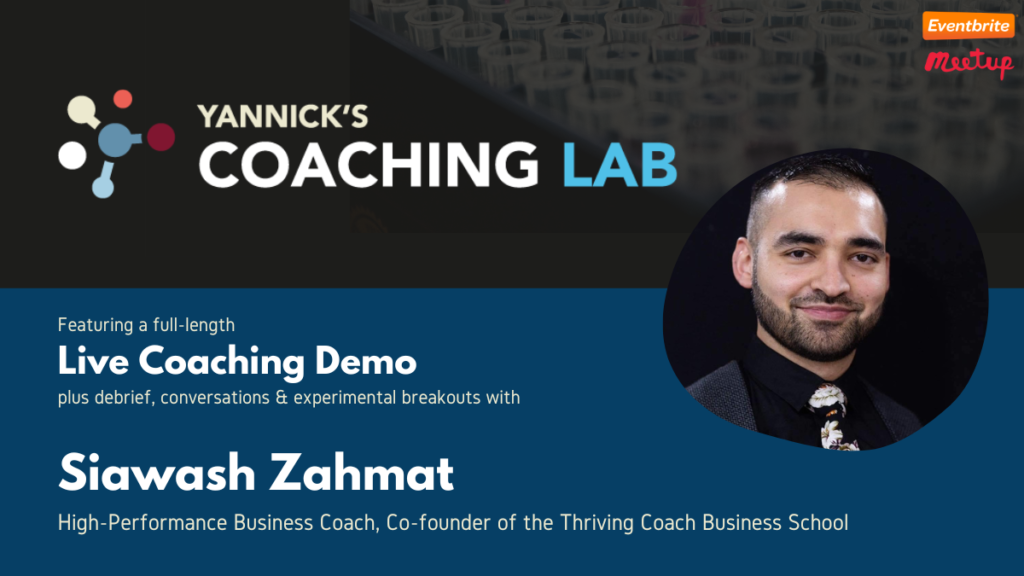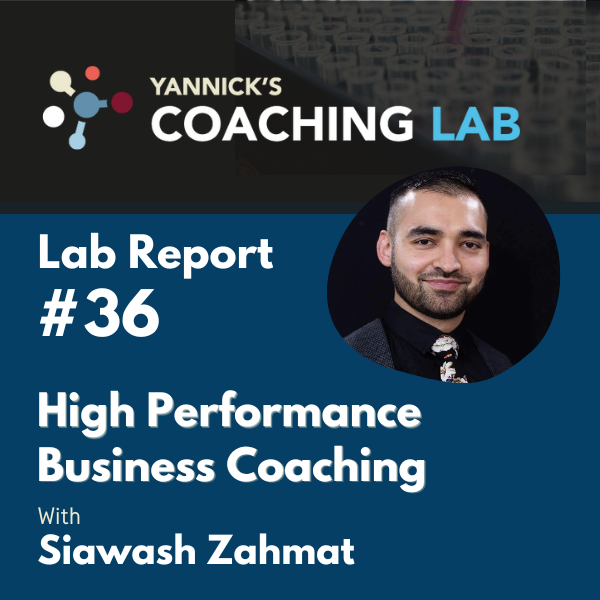
Yannick’s Coaching Lab features guest coaches from a broad variety of approaches, who showcase how they work as part of a live 45min coaching session, followed by reflections and Q&A with the audience.
Curious to know what this session was like? Have a peek at the Lab Report below or consider VIP membership to access the full recording of this and many more exciting sessions.
Yannick’s Coaching Lab #36 — Siawash Zahmat
Lab Report by Natalie Fraser
Summary
Trained initially at Animas Centre for Coaching, Siawash Zahmat has dedicated himself to the craft of coaching and to help other coaches build thriving businesses. He’s been continuing to train and develop himself over his 6 year coaching career and invested in mentors and coaches such as Steve Chandler. Siawash is the Co-host of the Talking about Coaching podcast and the co-founder of the Thriving coaches business school.
Siawash and his client have an existing relationship. The client is a fellow coach, former teacher of Siawash’s, and they host a podcast together. The client has come to coaching because of an insight that “what got me here won’t get me there”, and the desire to shift something, as well as to tap into Siawash’s business experience.
Key Insights
Session Prep
Siwash invited his client to send a long email before the session, outlining some key metrics for success in the next 12 months, and 3 years respectively. He also inquired about 3 key challenges in the client’s personal life and/or business.
“Let’s get present”
Siawash started the session inviting his client to breathe, and explained that he starts every session himself imagining that he’s been paid £100,000.00 – that this is a place he chooses to come from rather than somewhere he’s trying to get to.
Chess
“Business processes are the chess board”, Siawash explained as part of the contracting, “the business owner is the chess player”. The coaching will be focusing largely on the player, not the board itself.
Powerful Questions
“What would make this conversation extraordinary for you?”
Client – I am aware of the work you’ve done with many people helping them make a difference, and am interested to draw on your expertise.
“Is that the real challenge?”
The client spoke at some length about a certain aspect of his business which he recognizes resistance in, and Siawash challenged whether this was the core of his barrier towards growth or whether there was something deeper… this invited his client to reflect on his values more deeply.
Siawash encouraged his client to give space for the multiple possibilities that are availablethat will allow the business to grow, rather than focusing on the challenges or one/a fewpossibilities.
“What would be the impact if you were to know that you’ll receive 1 million pounds if you achieved your goal by the end of the year?”
This thought experiment invited the possibility for the client to imagine being profoundly motivated. However, in this client’s case, it illuminated the fact that money is not the motivation or meaning behind his work. Siawash moved on to another line of inquiry instead.
“How do you react to this statement: I don’t enjoy business growth?” And then…
“Who would you be without that story?”
Siawash drew on Byron Katie’s “The Work” here, inviting the client to challenge their narrativearound running a business.
Key Take-Aways
Presenting as a successful business coach may generate expectations for quick and immediate changes for clients. Some of this was certainly present for the client, who didn’t expect, but had hoped for a noticable shift in mindset, which at the end of the session
hadn’t occured. Siawash reminds us that, while a single session can have tremendous impact, change usually takes time and business coaching clients sign up for a 1-2 year journey.
When asking clients to provide detailed information pre-session, it sets expectations that this will be re-visited during the session. This wasn’t the case, and contracting around this would have helped to manage expectations. The process of writing it was a valuable experience for the client though. As Siawash explained, the e xercise is more about spottingthe language that the client uses, rather than necessarily the details shared.
Siawash advocates that it’s okay not to be in flow each and every session, or if their clients are left feeling a bit disappointed, or if there is resistance. It’s about playing the game. It’s also not just about what comes up in the session, it’s about what might come up later for the client in their own reflection as a result of the session. Trust that process. Over time it almost always pays off.
Siawash combines mentoring, coaching, and supervision. He gives practical follow-up and in-session exercises to help his clients develop their business, and has weekly sessions for accountability.
Key focus for business growth:
1) What do you want?
2) What is the price you’re willing to pay for that?
3) What is the price you’re NOT willing to pay for that?
Watch the recording of this session by joining the Lab as a member: www.GoCoachingLab.com
A list of all available recordings can be found at https://bit.ly/LabRecordings
This Lab Report was authored by Natalie Fraser
Natalie is an existential Counselling Psychologist, specialising in trauma and transformation, and curious about coaching. Interested in exploring life’s Big Questions? Find out more at: www.existentialofferings.com

